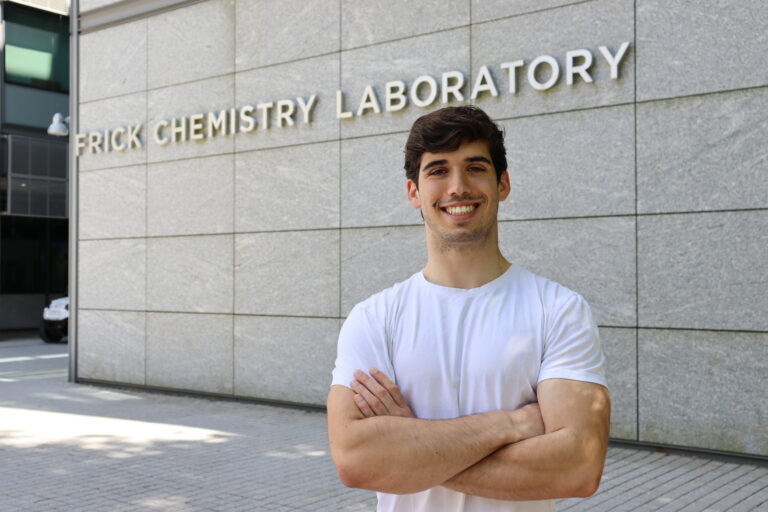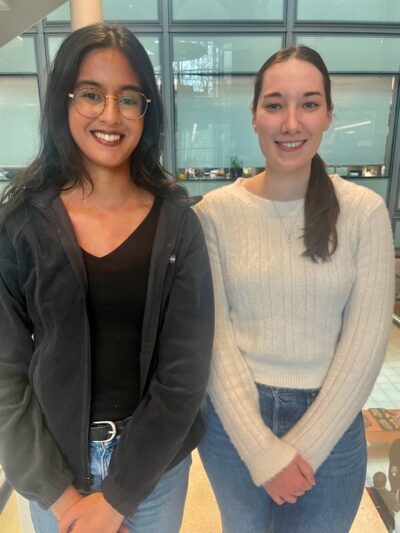

Erin E. Stache
Contact:
Erin Stache
Assistant Professor of Chemistry
[email protected]
Frick Laboratory, 261
609-258-8065
Faculty Assistant:
Angela Dolce
Faculty / Grants Assistant
[email protected]
Frick Laboratory, A87
609-258-5075
Research Focus
Research in our lab aims to integrate diverse fields, including organic chemistry, photochemistry, inorganic materials, and polymer chemistry, to pioneer fresh advancements in materials science and synthesis. One major aspect of our research is finding solutions for a more sustainable plastics economy. This work involves the application of innovative catalytic methods to formulate previously unexplored strategies for polymerization. Central to this approach is the discovery of novel monomers that unlock access to unprecedented materials, facilitating an in-depth exploration of their potential applications.
While techniques for producing high volume commercial plastics like polyethylene and polystyrene have attained a high level of sophistication, our lab also recognizes the pressing need to address the inadequate strategies for managing these materials at the end of their lifecycle. Another pivotal focus of our work lies in recycling commercial plastics to commodity chemicals, forging a pathway for valorization of plastic waste. Additionally, developing strategies for chemical recycling to monomer, to access a truly cyclic plastic economy, is a major focus of catalyst and material development. Our primary approach uses a light-to-heat conversion strategy, known as photothermal conversion, to produce intense thermal gradients capable of depolymerizing commercial plastics. We are studying photothermal conversion agents and catalysts to promote such a transformation to be applied to post-consumer waste.
In addition to our work in sustainable polymer chemistry, we are interested in exploring photothermal conversion as a general strategy for organic synthesis. Photon-mediated chemical processes offer a pathway to create complex, biologically significant compounds, a critical pursuit within the pharmaceutical and agrochemical industry. Yet, numerous reactions essential to synthesis often rely on the application of intense heat to activate chemical bonds. We aim to use photothermal conversion to overcome energy intensive and inefficient aspects tied to conventional bulk heating methods.
Honors
Bayer Early Excellence in Science Award, Chemistry, 2023
NSF CAREER Award, 2023
DOE Early Career Award, 2023
ACS Petroleum Research Fund Doctoral New Investigator Grant, 2023
Thieme Chemistry Journal Award, 2021
Selected Publications
“Photon-Promoted Temperature Gradients Enable Newman-Kwart Rerrangement Using Carbon Black via Photothermal Catalysis.” M. E. Matter, L. Camdzic, E. E. Stache* Angew. Chem. Int. Ed. accepted article https://doi.org/10.1002/anie.202308648
“Vitamin B12 Derivative Enables Cobalt-Catalyzed Atom Transfer Radical Polymerization.” S. D. Silab, C. Preston, E. E. Stache* J. Am. Chem. Soc. ASAPhttps://doi.org/10.1021/jacs.3c06783
“Photothermal Mediated Chemical Recycling to Monomers via Carbon Quantum Dots.” L. H. Kugelmass, C. Tagnon, E. E. Stache* J. Am. Chem. Soc. 2023, 145, 16090-16097.
“A Hydrometalation Initiation Mechanism via a Discrete Cobalt-Hydride for a Rapid and Controlled Radical Polymerization.” S. Dadashi-Silab, E. E. Stache* J. Am. Chem. Soc. 2022, 144, 13311-13318.
“Chemical Upcycling of Commercial Polystyrene via Catalyst-Controlled Photooxidation.” S. Oh, E. E. Stache* J. Am. Chem. Soc. 2022, 144, 5745-5749. Highlighted in Nature Research Highlight, C&EN 4/18/2022, featured on the PULSE, NSF Research News.
Related News

Jacobs, Stache Named 2026 Sloan Research Fellows


